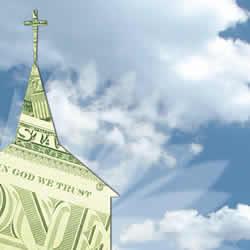 I read Simon Critchley's op-ed piece, "Coin of Praise" in yesterday's NY Times just before I read today's lectionary texts. http://happydays.blogs.nytimes.com/2009/08/30/in-cash-we-trust/ Here is a part of it. "To push this a little further, we might say that in the seemingly godless world of global finance capitalism, money is the only thing in which we really must have faith. Money is the one, true God in which we all believe. It is this faith that we celebrate in our desire for commodities, in the kind of fetishistic control that they seem to have over us. It’s not so much that we revere the things that money can buy. Rather, we venerate the money that enables us to buy those things. In the alluring display of shiny brands that cover the marketplace, it is not so much branded objects that we desire, but rather those objects insofar as they incarnate a quantifiable sum of money."
I read Simon Critchley's op-ed piece, "Coin of Praise" in yesterday's NY Times just before I read today's lectionary texts. http://happydays.blogs.nytimes.com/2009/08/30/in-cash-we-trust/ Here is a part of it. "To push this a little further, we might say that in the seemingly godless world of global finance capitalism, money is the only thing in which we really must have faith. Money is the one, true God in which we all believe. It is this faith that we celebrate in our desire for commodities, in the kind of fetishistic control that they seem to have over us. It’s not so much that we revere the things that money can buy. Rather, we venerate the money that enables us to buy those things. In the alluring display of shiny brands that cover the marketplace, it is not so much branded objects that we desire, but rather those objects insofar as they incarnate a quantifiable sum of money."I found this rather thought provoking, especially in light of today's reading from James. "For if a person with gold rings and in fine clothes comes into your assembly, and if a poor person in dirty clothes also comes in, and if you take notice of the one wearing the fine clothes and say, 'Have a seat here, please,' while to the one who is poor you say, 'Stand there,' or, 'Sit at my feet,' have you not made distinctions among yourselves, and become judges with evil thoughts?" James, along with Jesus, takes a fairly dim view of earthly riches and the efforts to acquire it. In one place Jesus goes so far as to say, "But woe to you who are rich, for you have received your consolation." A "woe" is the opposite of a blessing, in essence, a curse.
Noted Old Testament scholar Walter Brueggemann has said that we chase so hard after money because we have bought into what he calls "the myth of scarcity" rather than trusting in generous provisions of a loving God. And while I would agree with those who say that some sort of capitalism is superior to any other economic system yet devised, it is not without significant problems and dangers. Whether it be the sort of blind faith in "the market" that allowed regulators, bankers, and financiers to drive the world's economy off the cliff, the tendency to value people based on how much money they have, or the idolatry of self that claims I am responsible for all that I have, unfettered capitalism is fraught with potential to corrupt both the individual and society.
I have watched with interest as the recent political debate has found a new boogieman, "socialism." Presumably we should all run screaming in horror from any notion of socialism because it is some innate form of evil. But of course Social Security and Medicare are "socialist" styled programs. And a quick read of Acts' description of the early Church will find a group that would conform to many definitions of socialism.
It seems to me that in tough economic times our anxieties and fears grow. In such a climate, the "myth of scarcity" becomes all the more attractive, and we are driven to protect what is ours. But perhaps such tough times could also be a call for us to examine ourselves and see where our true faith lies; in money, in ourselves, or in the gracious promises of abundant life freely giving by God.
Click here to learn more about the Daily Lectionary.









